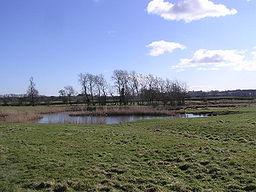Let Geoinvestigate quote for your next desk study or borehole site investigation in Darlington and Wetherby. From Geoinvestigate’s Middlesbrough office our team of dedicated geoscientists provide expertise in the Geo-environmental, Geotechnical and Contaminated Land sectors helping architects, builders, land surveyors, structural engineers, insurers, project managers and private home owners to get the right solution no matter the size of their development or how complex the problems with the ground may be.
It’s coming up to that time of year again, when, in the wetter winter months we can expect sinkholes to appear. Last year was a record year for the occurrence of sinkholes in the United Kingdom and also in Ireland. Some notable sinkhole collapses were the highly publicised disappearance of a families Lupo car in High Wycombe and the evacuation of a housing estate at Oatridge Gardens, Hemel Hempstead.
Though most sinkholes go unnoticed by the public (occurring as they do in farmland and isolated moorlands), a comparatively smaller number do get noticed and pose a serious risk to the public and to property.
In England, sinkholes occur in the Carboniferous Limestone from Kirkby Lonsdale to The Peak District in Derbyshire. They also occur in the Permian Gypsum deposits from Harrogate to Ripon and Darlington and in the Chalk belt from extending from Luton, High Wycombe via Swindon to Basingstoke, Guildford and Maidstone. Areas with marked circulating groundwater flow patterns such as Ripon are more prone to sinkhole formation than others. Sinkhole formation can be dramatic, because the surface land usually stays intact until there is not enough support. Then, a sudden collapse of the land surface can occur.
Geoinvestigate have accounts of sink holes appearing as early as the 12th Century in the Darlington area of Northern England associated with the gypsum geology in this area. Known as the Hells Kettles these large holes were said to have been created by a ferocious earthquake in 1179. Local myth has it that they are full of green, boiling, sulphurous water. People and animals are allegedly drowned or eaten alive by the Pikes and Eels that infest their waters. The Hell’s Kettles are said to contain the souls of sinners. Some report that these people (and animals in some cases) can be seen floating in the pools when they are clear.

Hells Kettles can be seen in farmland to the east of the A167 southern approach to Darlington
The Kettles are two pools that have been formed by catastrophic subsidence in 1179. The Permian rocks underlying the area include substantial thicknesses of evaporites – gypsum and gypsiferous mudstone. Subsidence resulting from subterranean dissolution of these beds is a frequent occurrence, though the scale of the Hell Kettles subsidence is exceptional. Surface runoff and seepage from calcareous springs has created the two pools, one of which is the only body of spring-fed open water in County Durham. There were originally four subsidence depressions, but one filled in and two are now linked in a pond aptly named ‘Double Kettle’.
It has been suggested that the Kettles may have inspired the scene in Lewis Carroll’s Alice’s Adventures in Wonderland in which Alice tumbles down a rabbit hole.
So sinkholes have occurred in the historical past and will continue to appear in the future. It is Geoinvestigate’s impression from the number of enquiries we have had about sinkholes from the public, homeowners and developers that the frequency of sinkhole appearance has increased in recent years and may be attributed to the changing weather pattern and the increase in prolonged periods of very heavy rainfall and flooding. Sky News were told that many sinkholes are never seen because they occur in isolated areas on farmland or on moorland where they are filled-up by farmers as they appear so probably many more are occurring than we think.
Geoinvestigate’s advice to anyone who is worried about sinkholes or who may think they may have found one on their property, in a park or on school grounds is that they should contact their local council or house insurer and report the incident particularly if they believe it may pose a risk to the public.
In addition to providing borehole site investigation services Geoinvestigate also provides services in the areas of geotechnical and geo-environmental consultancy, walk-over surveys, borehole drilling, site investigation, Phase 1 desk studies, Phase 2 site investigations, drilling and testing, landfill gas surveys and contaminated land investigations with full remediation and validation strategies.
Geoinvestigate would be pleased to quote for your next site investigation.

